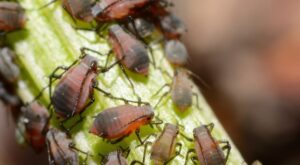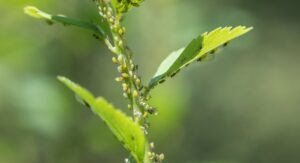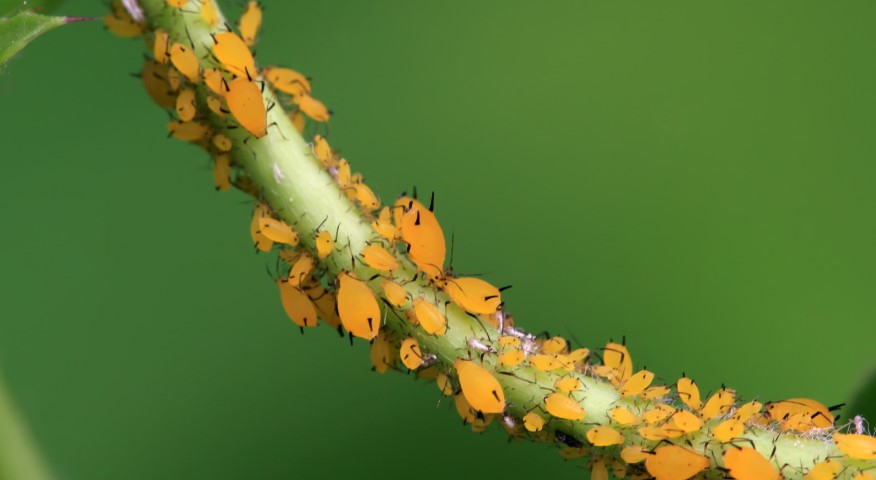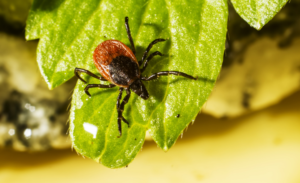Aphids, those tiny, pesky insects that love to feast on your prized plants, can quickly turn your garden into a buffet. These tiny, pear-shaped insects are notorious for their ability to reproduce rapidly and damage plants by sucking out their sap. Fortunately, there are effective ways to get rid of aphid infestations and protect your garden. This comprehensive guide will explore various methods to combat aphids and keep your plants thriving.
How to Get Rid of Aphid Infestation?

Before we delve into how to eradicate aphids, it’s important to understand these garden nuisances. Aphids come in various colours, such as green, black, yellow, and brown. They tend to cluster on the undersides of leaves and can be identified by their pear-shaped bodies and long antennae.
Aphids feed on plant sap by piercing the plant tissue with their needle-like mouthparts. In the process, they can transmit diseases, weaken the plant, and cause distorted growth. Let’s see how to eliminate them.
Pruning and Removing Affected Parts
One of the simplest ways to combat an aphid infestation is to prune and remove the affected parts of your plants. Carefully inspect your plants for clusters of aphids and, using pruning shears, cut off the infested leaves, stems, or flowers. Be sure to dispose of the affected plant material far away from your garden to prevent aphids from returning.
Use High Water Pressure
Aphids are fragile insects, and a strong stream of water can dislodge them from your plants. Use a hose with a nozzle attachment to gently spray your plants, focusing on the undersides of leaves where aphids like to hide. Repeat this process every few days to keep aphid populations in check.

Nature frequently gives its own pest control methods. Introduce natural predators of aphids into your garden, such as ladybugs, lacewings, and parasitic wasps. These beneficial insects will aid in the management of aphid populations. You can attract them by planting flowers and herbs that provide nectar and shelter.
Use Homemade Insecticidal Soap
Insecticidal soap is an effective and environmentally friendly way to get rid of aphids. Mix a solution of water and mild liquid soap (avoid using detergents or harsh soaps) and spray it directly onto the aphids. The soap disrupts their cell membranes, causing them to dehydrate and die. Be sure to rinse the plants with water after a few hours to prevent damage.
Use Neem Oil
Neem oil, which is obtained from the neem tree, is a natural repellent for insecticide. It is effective against aphids and many other garden pests. Mix neem oil with water and a few drops of dish soap, then spray it onto the affected plants. Neem oil kills aphids and disrupts their feeding and reproductive cycles.
Use Organic Pesticides
You can turn to organic pesticides as a last resort if all else fails. These products target specific pests while causing the least amount of harm to beneficial insects and the environment. Always follow the manufacturer’s instructions and use these pesticides sparingly.
Regular Inspections

Regularly inspect your plants for signs of aphids, such as curled or distorted leaves, sticky honeydew residue, or the presence of ants. Regularly Inspect every plant under the knowledge of pest control service to avoid any insect infestation. They know how and what to do at the moment. Catching aphid infestations early can make them easier to control.
Conclusion
Aphids may be persistent, but you can successfully rid your garden of these troublesome insects with the right strategies. Remember to combine multiple methods for the best results and get help from pest control services to eliminate the infestation. You can protect your plants and enjoy a healthy, thriving garden by staying vigilant and using natural and organic solutions.






